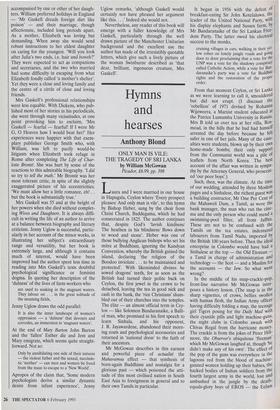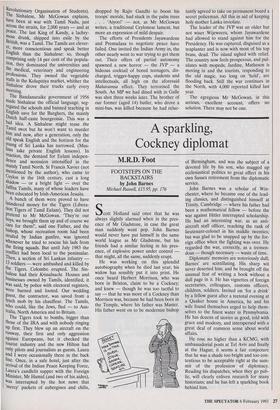Hymns and hearses
Anthony Blond
ONLY MAN IS VILE: THE TRAGEDY OF SRI LANKA by William McGowan Picador, £6.99, pp. 398 Laura and I were married in our house in Hapugala, Ceylon where 'Every prospect pleases/ And only man is vile', to this hymn by Bishop Heber, sung by the choir from Christ Church, Baddegama, which he had consecrated in 1825. The author continues that, despite God's 'lavish kindness/ The heathen in his blindness/ Bows down to wood and stone'. Heber was one of those bullying Anglican bishops who set his mitre at Buddhism, ignoring the Kandyan Convention, whereby the British gained the island, declaring 'the religion of the Boodoo inviolate . . . to be maintained and protected'. With likeminded divines he sowed dragons' teeth, for as soon as the British had turned their polite back on Ceylon, the first jewel in the crown to be detached, leaving the tea in good nick and cash in the bank, the 'rice Christians' sham- bled out of their churches into the temples. The elite — an almost official term in Cey- lon — like Solomon Bandaranaike, a Balli- ol man, who promised in his first speech to learn Sinhala, and his opponent, J. R. Jayawardene, abandoned their morn- ing coats and psychological accessories and returned in 'national dress' to the faith of their ancestors.
Mr McGowan describes in this earnest and powerful piece of actuante the Mahavamsa effect — that synthesis of born-again Buddhism and nostalgia for a glorious past — which poisoned the atti- tude of this most civilised nation in South East Asia to foreignness in general and to their own Tamils in particular. It began in 1956 with the defeat of breakfast-eating Sir John Kotelaluwa, the leader of the United National Party, with his display elephants and Sussex farm, by Mr Bandaranaike of the Sri Lankan Free- dom Party. The latter owed his electoral success to the monks, cruising villages in cars, walking in their yel- low robes on lonely jungle roads and going door to door proclaiming that a vote for the UNP was a vote for the shadowy conspiracy called Catholic Action, while a vote for Ban- daranaike's party was a vote for Buddhist rights and the restoration of the proper order.
From that moment Ceylon, or Sri Lanka as we were learning to call it, smouldered but did not erupt. (I discount the 'rebellion' of 1971 devised by Rohanna Wijeweera, a Marxist student educated at the Patrice Lumumba University in Russia. Mrs B told us over tea at her villa, Ros- mead, in the hills that he had had himself arrested the day before because he felt safer in one of her jails. Many of the casu- alties were students, blown up by their own home-made bombs; their only support from the Communist world was a pile of leaflets from North Korea. The best account of the affair was written in sympa- thy by the Attorney General, who prosecut- ed 'our poor boys'.) Such, then, was the climate. At the time of our wedding, attended by three Moslem pages and a Sinhalese, the richest guest was a building contractor, Mr One Per Cent of the Mahaweli Dam, a Tamil, as were the bank manager, the man who ran the cine- ma and the only person who could mend a swimming-pool filter, all from Jaffna. These are not to be confused with the Tamils on the tea estates, indentured labourers from Tamil Nadu, imported by the British 100 years before. Then the ideal enterprise in Colombo would have had a Sinhalese at the top — the Old Etonian — a Tamil in charge of administration and technology — the Scot — and a Muslim for the accounts — the Jew. So what went wrong?
In the middle of his snap-crackle-pop, front-line narrative Mr McGowan inter- poses a history lesson. (The snap is in the sharp vignettes, of crows, bellies swollen with human flesh, the Indian Army officer having difficulty folding a map, the teenage girl Tigers posing for the Daily Mail with their cyanide pills and light machine-guns, the night clubs in Colombo awash with Chivas Regal from the hurricane money- The crackle is from the jokes of Peter Hill: more, the Observer's ubiquitous 'fireman' which Mr McGowan laughed at, though 'he didn't make any of his own'. The effect of the pop of the guns was everywhere in the lagoons red from the blood of machine- gunned women holding up their babies, the hacked bodies of Indian soldiers from the fourth largest army in the world, lost and ambushed in the jungle by the death- equals-glory boys of EROS — the Edam Revolutionary Organisation of Students). The Sinhalese, Mr McGowan explains, have been at war with Tamil Nadu, just across the straits, for 2,000 years — and at Pence. The last King of Kandy, a lachry- mose drunk, shipped into exile by the British, was a Tamil. The Tamils are clever- er, more conscientious and speak better English than the Sinhalese: so, though Comprising only 14 per cent of the popula- tion, they dominated the universities and the medical, veterinary and engineering Professions. They owned the vegetable stalls in the Kolupitiya market, whither the Sinhalese drove their trucks early every morning. The Bandanaraike government of 1956 made Sinhalese the official language, seg- regated the schools and banned teaching in English save for the Burghers, the mainly Dutch half-caste bourgeoisie. This was a bad idea. A Sinhalese might tease the Tamil swot but he won't want to murder him and now, after a generation, only the Old speak English and the horizon for the young of Sri Lanka has narrowed. (Mus- Inns take private English lessons). In reaction, the demand for Eelam indepen- dence and secession intensified in the mainly Tamil North. St Francis Xavier (not Mentioned by the author), who came to Ceylon in the 16th century, cast a long shadow — or a bright light — over the Jaffna Tamils, many of whose leaders have been educated by Irish-American Jesuits. A bunch of them were proved to have laundered money for the Tigers (Libera- tion Tigers of Tamil Eelam). They did not Pretend to Mr McGowan. 'They're our boys, we brought them up and of course we care for them!', said one Father, and the bishop, whose recreation room had been strafed by Indian gunfire, was ignored whenever he tried to rescue his lads from the firing squads. But until July 1983 the conflict had been local to the peninsular. Then, a section of Sri Lankan infantry 13 soldiers — were ambushed and killed by the Tigers. Colombo erupted. The Sin- halese had their Kristalnacht. Houses and businesses owned by Tamils, identified, it Was said, by police with electoral registers, were burned and looted. Our wedding guest, the contractor, was saved from a lYnch mob by his chauffeur. The Tamils, Who could, like the Jews, fled — to Aus- tralia, North America and to Britain.
The Tigers took to bombs, bigger than those of the IRA and with nobody ringing up first. They blew up an aircraft on the runway, their first and only aggression against Europeans, but it checked the tourist industry and the new Hilton had °WY pilots and journalists as guests. Laura and I were occasionally there in the back line. Once, in a safe hotel, just after the arrival of the Indian Peace Keeping Force, Laura's candlelit supper with the Foreign Minister, Mr Hamid (and two of his aides), Was interrupted by the hot news that mercy' packets of aubergines and chilis, dropped by Rajiv Gandhi to boost his troops' morale, had stuck in the palm trees . . . 'Aiyoo!' — not, as Mr McGowan writes, a traditional Ceylonese lament, but more an expression of mild despair.
The efforts of Presidents Jayawardene and Premadasa to negotiate peace have failed. One invited the Indian Army in, the other nearly went to war trying to get them out. Their offers of partial autonomy spawned a new horror — the JVP — a hideous cocktail of bored teenagers, dis- charged, trigger-happy cops, students and intellectuals, all high on the aforesaid Mahavarnsa effect. They terrorised the South. An MP we had dined with in Galle was shot three weeks later. The brother of our former (aged 14) butler, who drove a mini-bus, was killed because he had reluc- tantly agreed to take on permanent board a secret policeman. All this in aid of keeping holy mother Lanka inviolate.
The leader of the JVP was an older but not wiser Wijeweera, whom Jayawardene had allowed to stand against him for the Presidency. He was captured, disguised as a teaplanter and is now with most of his top brass, dead. The island sighed with relief. The country now feels prosperous, and pul- ulates with mopeds; Jardine, Matheson is moving in and the tourists, responding to the old magic, too long on 'hold', are flooding back. Still the war continues in the North, with 4,000 reported killed last year.
The egregious Mr McGowan, in this serious, excellent account, offers no solution. There may not be one.























































 Previous page
Previous page